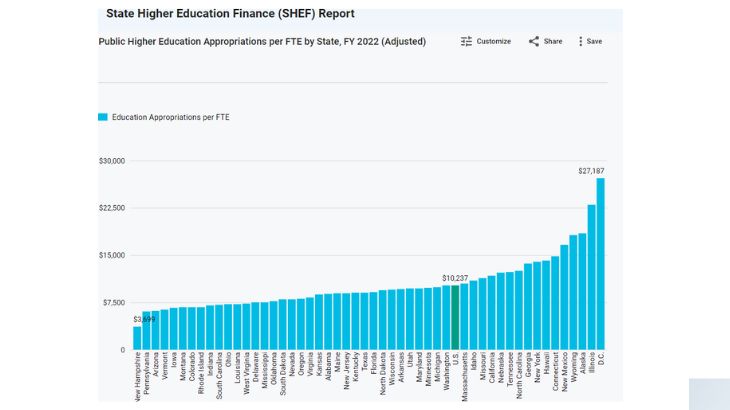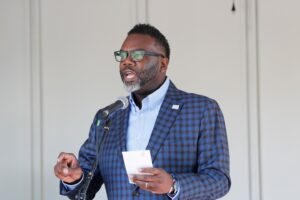‘Watch out taxpayers’: Race-based funding bill filed in Illinois
On Tuesday, July 30, 2024 I attended the press conference on higher education funding led by State Senator Kimberly Lightford and State Representative Carol Ammons. They introduced SB3965, a bill…

On Tuesday, July 30, 2024 I attended the press conference on higher education funding led by State Senator Kimberly Lightford and State Representative Carol Ammons. They introduced SB3965, a bill which creates a new funding formula for higher education in Illinois based off of race and other demographic factors.
This new legislation is the culmination of two years of work by a 33-person commission and hearings from the Spring legislative session earlier this year. I wrote extensively about their plans in this article.
The people pushing this plan are looking to do the following things:
- Fund higher education based on “equity” needs. Those equity needs, as noted by the bill sponsors, include demographic characteristics including race. The Commission’s report showed tiered funding charts that proposed universities receive $8,000 in additional funding for each Black student, $6,000 for a Hispanic student, and $4,000 for a rural student – the only catagory not dependent on race. Asian and white student populations would not garner any additional funding, unless they lived in rural areas. The commission report is linked HERE. This is Race-Based funding and at the press conference, both Kimberly Lightford and Carol Ammons admitted that.
- Increase university funding every year for ten years by $135 million and distribute that based on the “equity” funding model. When asked how it would be funded in the press conference, there was no answer.
- Make taxpayers and residents believe that higher education in Illinois has been underfunded for years and that it is a primary cause of our high school graduates going to colleges out of state. This is easily debunked as I did in the article above. The Commission used information collected from SHEEO, State Higher Education Executives Officers Association, for funding and student data and then ignored SHEEO’s most recent report showing Illinois in first in the nation for state funding to higher education. Here is the chart that is in my previous article.

Numerous advocacy groups and media were present at the press conference and my sources tell me that the entire press conference was coordinated by Advance Illinois, an education lobbying group that continually advocates for additional funding for education regardless of the system-wide failure of education in Illinois. While there are pockets of success, the K-12 public system educates only about a third of the students and our universities, that measure graduation rates based on 6-years, still fail about half of the students that start.
The legacy media asked no tough questions. I was allowed to ask one question and then passed over for my additional questions. For the record, I have hosted numerous press conferences myself and would answer multiple questions from media and others in attendance until there were no more questions! They do not want the public to know what they are up to!
I had further conversations with a couple of the participants individually after the press conference. I asked the President of Northern Illinois University, Lisa Freeman, how much more in additional funding she wanted for NIU. She refused to give a number only stating that the entire system needs more state support. I then asked if $10 million would be enough since that is the amount of increase she asked for in this year’s budget request, she would not tell me if that was enough. I noted that per her statement to the legislature, 43% of her students pay no tuition and fees, if those students (approximately 6,450) paid just $1,600 a year towards their education, she would have $10 million extra dollars. She said her students couldn’t afford that.
When I asked Ms. Freeman about the SHEEO report that shows Illinois has the highest state support per full-time equivalent student in the nation at nearly $23,000, she remarked that that’s because of the pension cost. BINGO! That’s right – the pensions are bleeding the systems. And everyone knows it. And no one will do anything about it. They should get NO new money without comprehensive pension reform.
Other takeaways –
- A UIC student stated at the press conference that she works multiple jobs to afford her education and that it is really hard to afford college. I asked her individually how much she pays per year for her own education. Her response – $2,000-$4,000. That works out to working 5 hours a week maximum and netting $15/hour which given Chicago’s minimum wage of $16.20, that should not be hard to do. By the way, I knew what her answer would be because the UIC Chancellor a few years ago told me 40% of the students pay $4,000 or less to attend his “Worldclass” university. I find it utterly appalling that they only pay $4,000 per year when many other families and students are saddled with tens of thousands of expenses. Given that UIC is largely a commuter school, the student’s cries of unaffordable college ring hollow.
- No one wanted me to talk to the participants. The NIU President and the UIC student were escorted away from me. It shows you that they do not want to have the truth about funding and results to come out.
- The media is clueless about this topic which is why they asked no hard questions.
- The $1.4 billion the Commission wants in new funding could all be funded in ONE YEAR and immediately, if Pritzker wanted to. He could simply not fund illegal immigrant healthcare and other support. Of course, there are numerous other ways to find the $135 million. Instead, Prtizker cut Chen Li, President of Gotion, the CCP-backed slave labor company, $125 million in checks just this year.
This bill is on a fast track right now – Watch out taxpayers, you are about to get fleeced again.
This article was originally published at Breakthrough Ideas and is republished with permission.



